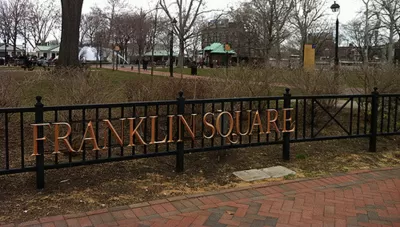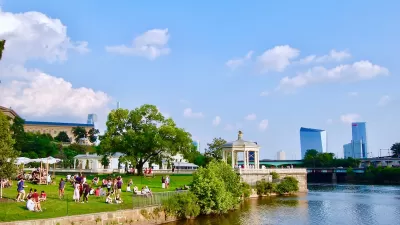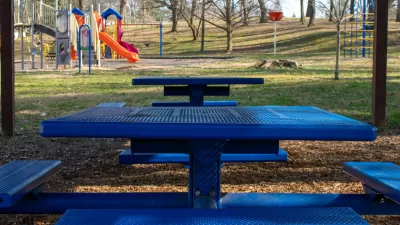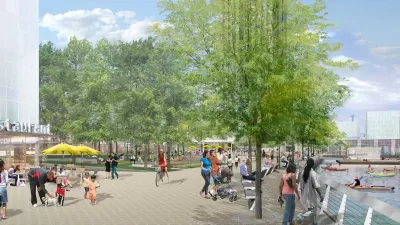Philadelphia's Franklin Square will require admission in the evening this spring, for the duration on a Chinese lantern festival. A critic faults the "philosophy of privatism" for robbing the park of its democratic qualities.

Philadelphia Inquirer Architecture Critic Inga Saffron establishes the stakes in a controversy over an ongoing festival in Franklin Square:
Urban parks are the physical embodiment of our democratic system, maybe the only place in our increasingly lopsided society where rich and poor can come together as equals. Anyone can walk into an urban park, sit on a bench, and enjoy the sunshine, gratis. At least, that's how it is supposed to work.
Those ideals run counter to the current state of Franklin Square, according to Saffron, which until June 12 is surrounded by a chain-link fence and a black curtain. "The enclosure, which looks like something you would find at a top-secret construction site, was installed last week so the park's nonprofit manager, Historic Philadelphia Inc., could lease the public square to a private company for a nightly Chinese lantern festival," explains Saffron.
Saffron argues that "parks exist to provide city-dwellers with a green respite, not do yeoman's work for the economy" before providing a brief history of how it came to be that cities turned parks into test beds for public-private partnerships.
Stephen Salisbury, culture writer for the Inquirer, also wrote about the event's effects in Franklin Square earlier in April.
FULL STORY: Changing Skyline: The public cost of privatizing Philadelphia's parks

Maui's Vacation Rental Debate Turns Ugly
Verbal attacks, misinformation campaigns and fistfights plague a high-stakes debate to convert thousands of vacation rentals into long-term housing.

Planetizen Federal Action Tracker
A weekly monitor of how Trump’s orders and actions are impacting planners and planning in America.

In Urban Planning, AI Prompting Could be the New Design Thinking
Creativity has long been key to great urban design. What if we see AI as our new creative partner?

Florida Seniors Face Rising Homelessness Risk
High housing costs are pushing more seniors, many of them on a fixed income, into homelessness.

Massachusetts Budget Helps Close MBTA Budget Gap
The budget signed by Gov. Maura Healey includes $470 million in MBTA funding for the next fiscal year.

Milwaukee Launches Vision Zero Plan
Seven years after the city signed its Complete Streets Policy, the city is doubling down on its efforts to eliminate traffic deaths.
Urban Design for Planners 1: Software Tools
This six-course series explores essential urban design concepts using open source software and equips planners with the tools they need to participate fully in the urban design process.
Planning for Universal Design
Learn the tools for implementing Universal Design in planning regulations.
Gallatin County Department of Planning & Community Development
Heyer Gruel & Associates PA
JM Goldson LLC
City of Camden Redevelopment Agency
City of Astoria
Transportation Research & Education Center (TREC) at Portland State University
Jefferson Parish Government
Camden Redevelopment Agency
City of Claremont





























